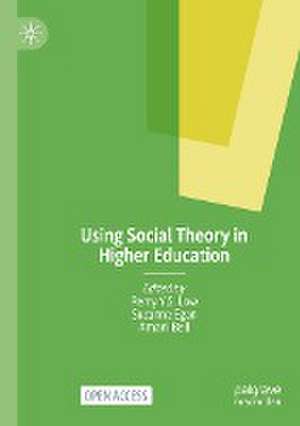Using Social Theory in Higher Education
Editat de Remy Y.S. Low, Suzanne Egan, Amani Bellen Limba Engleză Paperback – 14 oct 2023
| Toate formatele și edițiile | Preț | Express |
|---|---|---|
| Paperback (1) | 352.41 lei 6-8 săpt. | |
| Springer International Publishing – 14 oct 2023 | 352.41 lei 6-8 săpt. | |
| Hardback (1) | 360.15 lei 3-5 săpt. | +27.55 lei 4-10 zile |
| Springer International Publishing – 14 oct 2023 | 360.15 lei 3-5 săpt. | +27.55 lei 4-10 zile |
Preț: 352.41 lei
Nou
Puncte Express: 529
Preț estimativ în valută:
67.44€ • 70.15$ • 55.68£
67.44€ • 70.15$ • 55.68£
Carte tipărită la comandă
Livrare economică 14-28 aprilie
Preluare comenzi: 021 569.72.76
Specificații
ISBN-13: 9783031398193
ISBN-10: 303139819X
Pagini: 284
Ilustrații: XIV, 284 p.
Dimensiuni: 148 x 210 mm
Greutate: 0.36 kg
Ediția:1st ed. 2024
Editura: Springer International Publishing
Colecția Palgrave Macmillan
Locul publicării:Cham, Switzerland
ISBN-10: 303139819X
Pagini: 284
Ilustrații: XIV, 284 p.
Dimensiuni: 148 x 210 mm
Greutate: 0.36 kg
Ediția:1st ed. 2024
Editura: Springer International Publishing
Colecția Palgrave Macmillan
Locul publicării:Cham, Switzerland
Cuprins
Chapter 1 Other people’s ideas: An introduction to using social theory in higher education.- Chapter 2 Sit Down, be Humble: The influence of the Work of Linda Tuhiwai Smith on our research.- Chapter 3 The decolonial imperative - text and context: a response to Amani Bell and Gulwanyang Moran .- Chapter 4 After Belonging: Aileen Moreton-Robinson’s ‘I Still Call Australia Home’ .- Chapter 5 In belonging: a response to Timothy Laurie .- Chapter 6 Deploying Rose and Abi-Rached to ‘make sense’ of the rise of the ‘brain sciences’ in the field of violence against women.- Chapter 7 What do we talk about when we talk about neuro? A response to Suzanne Egan.- Chapter 8 The power, passions, and perils of identity: On Chantal Mouffe, .- Chapter 9 Connections, engagements and troubles: a response to Remy Y.S. Low.- Chapter 10 The Foggy Window: Passive empathy and the fight for testimonial reading in neoliberal higher education.- Chapter 11 Performing empathy with neoliberalism, or Kendall Jenneron the streets, Thomas Gradgrind in the sheets: a response to Lauren Weber.- Chapter 12 Understanding higher education enrolment through Michel Foucault’s biopolitics.- Chapter 13 Students, biopolitics, and state racism: a response to Ren-Hao Xu.- Chapter 14 Wrestling with monsters: critique, climate change, and comets.- Chapter 15 Still wrestling with monsters: a response to Pat Norman.- Chapter 16 Dialogues between activist knowledge and Southern Theory .- Chapter 17 Approximate Geographies: a response to José Fernando Serrano Amaya.- Chapter 18 The historian as pedagogue: on Hayden White’s practical past.- Chapter 19 What stories to tell: a response to Remy Low .- Chapter 20 The good university? Colourful histories, ongoing troubles and changing contexts.- Chapter 21 The good university examined: a response to Meenakshi Krishnaraj, Ren-Hao Xu, and Pat Norman.- Chapter 22 How we use social theory: common threads and concluding thoughts.
Notă biografică
Remy Y.S. Low is Senior Lecturer at the University of Sydney, Australia
Suzanne Egan is Lecturer in the School of Social Sciences, Western Sydney University, Australia
Amani Bell is Associate Professor at the University of Sydney, Australia
Suzanne Egan is Lecturer in the School of Social Sciences, Western Sydney University, Australia
Amani Bell is Associate Professor at the University of Sydney, Australia
Textul de pe ultima copertă
This open access book offers a unique and refreshing view on working with social theory in higher education. Using engaging first-person accounts coupled with critical intellectual analysis, the authors demonstrate how theory is grappled with as part of an ongoing practice rather than a momentary disembodied encounter. In a structure that creates a space for relational dialogue, each chapter is followed by a response from another author, demonstrating the varied interpretive possibilities of social theory. Collectively the authors invite the reader to engage with them in questioning the usefulness of social theory in higher education teaching and research, in considering its possibilities and limits, and in experiencing the opportunity it offers to understand ourselves and our work differently. Written in a way that is scholarly yet accessible, the contributors explore how social theories can be used to think through issues that are emerging as key social and political concerns in higher education and beyond. The book will be of interest to advanced undergraduates, postgraduates, and early-career academics, as well as established scholars.
Remy Y.S. Low is Senior Lecturer at the University of Sydney, Australia
Suzanne Egan is Lecturer in the School of Social Sciences, Western Sydney University, Australia
Amani Bell is Associate Professor at the University of Sydney, Australia
Remy Y.S. Low is Senior Lecturer at the University of Sydney, Australia
Suzanne Egan is Lecturer in the School of Social Sciences, Western Sydney University, Australia
Amani Bell is Associate Professor at the University of Sydney, Australia
Caracteristici
Foregrounds situated experiences of using social theory Focuses on theorists whose work addresses emerging social and political issues Includes first-person accounts as a 'way in' to the theory This book is open access, which means that you have free and unlimited access
